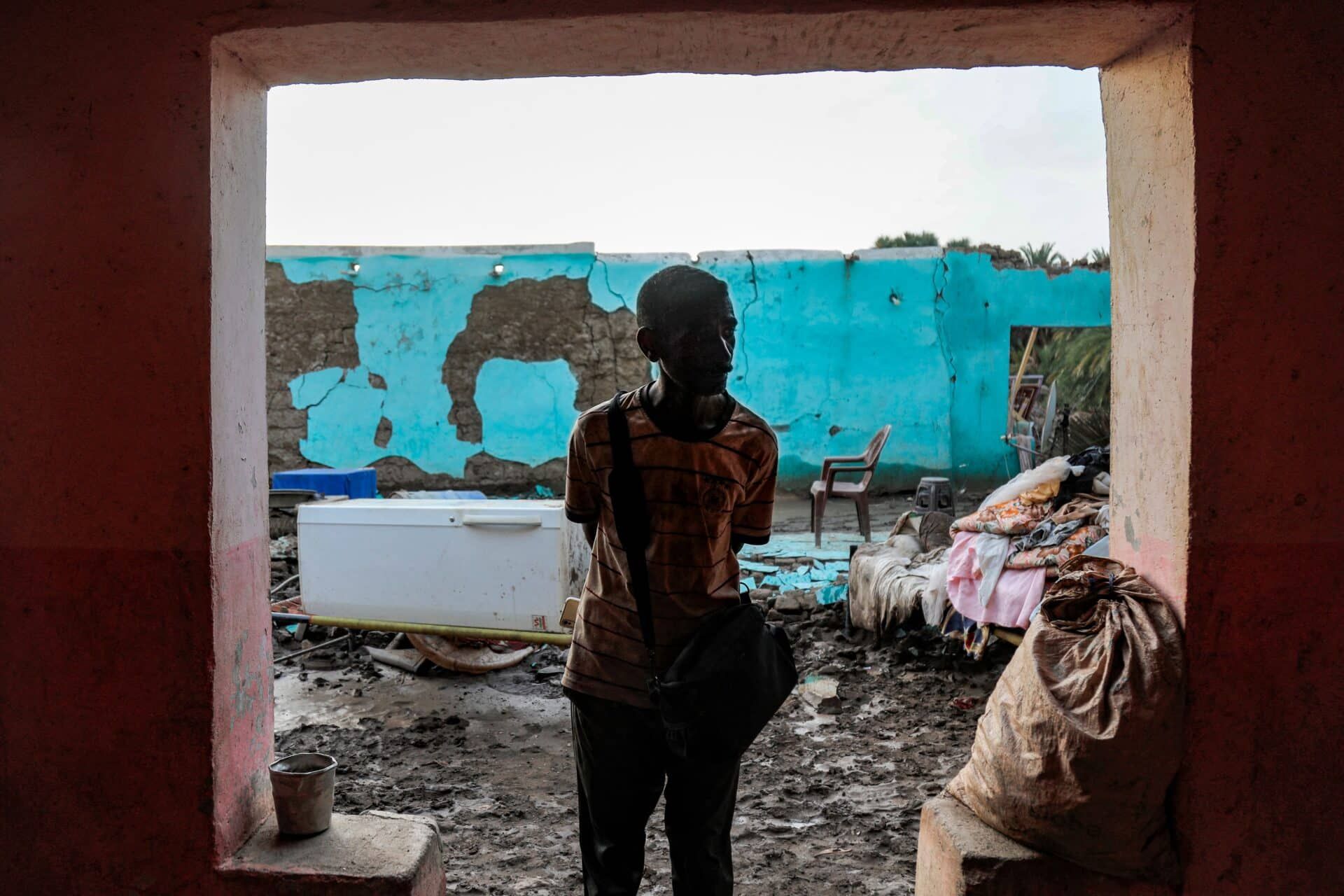Sudan’s conflict escalates, endangering millions
By Erik English | August 14, 2023
With war crimes rampant throughout the country and little hope for a resolution in sight, the two warlords that have been fighting for national control of Sudan since April show no signs of stopping. Sudan is already one of the most vulnerable and least prepared nations in the world to respond to the effects of climate change, a challenge that is exacerbated by poor governance and prolonged conflict.
Since the start of the conflict, basic services have become scarce and expensive; more than 3.5 million people have been displaced, 80 percent of the country’s hospitals have shut down, and the International Criminal Court launched an investigation into the violence in Darfur. The coming rainy season will bring flooding and make disease outbreaks of cholera, dysentery and polio more likely. Measles outbreaks have already resulted in the deaths of at least 13 children and the latest Integrated Food Security Phase Classification revealed that more than 20 million people face acute food insecurity, of whom six million are only one step away from famine.
Much of the news coverage has focused on Khartoum, where guerilla warfare broke out in the streets; but as the war has dragged on, the violence has continued to spread throughout the country. Decades of war have made Sudan’s institutional systems weak, and the current conflict compounds the challenges—such as food insecurity and disease outbreaks—that the Sudanese will continue to face in the future.
At the root of the conflict is a struggle to become heir to the dictatorship of Omar al-Bashir, who was overthrown in 2019. Negotiations to schedule an election and establish a democratically elected government have been underway for years, with a framework agreement negotiated as recently as January. However, fighting broke out after the deputy of the current de facto president objected to how and when his militia would be incorporated into the national army. Multiple ceasefires have been brokered by the United States and Saudi Arabia, but none has provided a lasting end to the violence, which is fueled by decades long ethnic tensions that continue today.
A history of violence. Geographically, Sudan is situated at the crossroads of Africa and the Middle East. Much of its recent history has been fueled by ethnic tensions between those identifying as African and those identifying as Arab, identities which were fostered by British colonialists. In 1989, Omar al-Bashir came to power in a coup that enforced Islamist principles throughout the nation. Nomadic Arab herders had been driven onto African farmlands by drought and desertification, creating conflict over resources with the non-Arab Sudanese. In 2003, non-Arab Sudanese herders in the Darfur region formed a rebellion to end their decades-long economic marginalization by al-Bashir’s Islamist government.
The uprisings in the Darfur region were brutally put down by al-Bashir, who enlisted an Arab militia of camel traders known as the Janjaweed. For years, these government-sanctioned militias backed the Sudanese Armed Forces (SAF), summarily executing, raping, and destroying communities throughout one of the poorest and most inaccessible regions in the world. One of the Janjaweed militants who caught the eye of then-president al-Bashir was Mohamed Hamdan Dagalo, known as “Hemedti.”
Alex de Waal, director of the World Peace Foundation, has pointed out that when South Sudan declared independence and became an independent state in 2011, the country became two African nations with ethno-linguistic diversity. However, the ruling class in north Sudan didn’t see it that way, instead preferring to view an African South Sudan and an Arab, Islamist north Sudan. As such, ethnic tensions continued to drive conflict in areas that didn’t identify as Arab.
Trying to address the reemerging conflicts and to dilute the power of the national army, thereby reducing the likelihood of a military takeover, al-Bashir formalized the Janjaweed militias as the Rapid Support Forces (RSF) in 2013 with Hemedti at the helm. The RSF continued its brutal crackdown in Darfur and throughout Sudan, even sending troops to Yemen to fight against the Iran-backed rebels on behalf of a Saudi-led coalition.
Ever the opportunist, in 2019, Hemedti turned on al-Bashir and helped overthrow him in a coup alongside the SAF and its leader, Abdel Fattah al-Burhan. A civilian-military partnership to organize democratic elections was formed a few months later, with al-Burhan as the head of the military’s transition council. In 2021, al-Burhan and Hemedti organized another coup to oust the civilian council and maintain military control over Sudan.
Since then, the SAF and RSF have negotiated with pro-democracy forces to incorporate the RSF into the SAF and schedule democratic elections. That is, until Hemedti withdrew from the negotiations on April 15th and violence erupted in Khartoum, then rippled through the rest of the country.
Mai Hassan, a professor of political science at MIT, blamed the conflict on differing goals for the shape of the security sector and election timing, which go back to the US and British negotiations after the coup in 2021. In effect, the SAF wanted the RSF to be incorporated into the national armed forces within two years, while the RSF preferred a longer 10-year time frame. According to Hassan, “The West was pushing them to come to an agreement so quickly. Not nailing down the specifics of what this reform would look like or actually involving a lot of civilian groups in the process was one of the reasons, in my view, that we got this outbreak of violence, even if, probably, we were going to get here regardless.”
The SAF possesses tanks, planes, and high-tech weaponry of an established army, while the RSF is fighting a guerilla war in the streets of Khartoum and other cities around Sudan. The RSF controls gold mines in the Darfur regions of the country and has recruited soldiers by offering higher pay than the SAF. While the SAF still has a clear technological advantage, the RSF has begun to deploy armed drones, and the technology gap will continue to shrink, especially as regional actors start to throw weight and money around.
Regional implications. Recognizing the risk that the conflict would devolve into a proxy war involving regional powers, the United States quickly began negotiating for a ceasefire after the outbreak of hostilities. Those negotiations, spearheaded by the United States and Saudi Arabia, have so far failed, and the prolonged conflict has indeed become a proxy war. As de Waal puts it, “Sudan has become part of the security perimeter of the gulf states.”
The involvement of other countries isn’t a new phenomenon in Sudan, where regional powers have been battling for influence for decades, primarily over Islamist governance systems.
The Muslim Brotherhood has been an active and influential force in Sudan since Omar al-Bashir took power in 1989. Turkey and Qatar are considered supporters of political Islam and the Muslim Brotherhood, while the United Arab Emirates (UAE) and Saudi Arabia oppose Islamic political ideologies. Egypt and Turkey have allied with al-Burhan and the SAF, while the UAE has thrown its support behind Hemedti and the RSF.
Meanwhile, Western nations are concerned about the emergence of a Russian base in Sudan, located on the Red Sea, which both al-Burhan and Hemedti have signaled their openness to.
The possibility of a wider and more intractable war is not theoretical. A Libyan warlord, Khalifa Haftar, has provided training to the RSF for its guerilla war, and in April the Guardian newspaper described his continued involvement as a “nightmare scenario” with “multiple regional actors and powers fighting a proxy war in the country of more than 45 million people.” Meanwhile, Egypt has sent planes and soldiers to fight on behalf of the SAF.
The Sudan conflict risks exacerbating the humanitarian crisis across the Horn of Africa region, where millions remain in need of food assistance. Thousands of South Sudanese refugees fled into Sudan after a civil war in 2013; now thousands of them are fleeing conflict again, returning home to South Sudan amid more violence and uncertainty. The new fighting in Sudan has led others to flee to Chad, Egypt, and other countries in the Horn of Africa, where a devastating drought and prolonged conflict have left many on the verge of famine.

Looming catastrophe. As of August 7, more than three million people have been displaced within Sudan and nearly 900,000 refugees, asylum seekers, and returnees have fled the country. In late July, Norway, the United Kingdom, and the United States released a joint statement to “condemn in the strongest terms the ongoing violence in Darfur, especially reports of killings based on ethnicity and widespread sexual violence by the Rapid Support Forces (RSF) and allied militias.” The Famine Early Warning System Network (FEWS Net) has warned that the looting of humanitarian supplies, the targeting of aid workers, the diversion of assistance by armed groups, and bureaucratic obstacles will continue to interfere with aid efforts.
Hospitals and health centers through the country have shut down, and the destruction of the health infrastructure has led to an increased occurrence of disease and malnutrition. As of July 28, disease outbreaks of malaria, measles, dengue, and acute diarrhea have all increased. The WHO expects more deaths from outbreaks to emerge as health services collapse. The conflict has also made it difficult to deliver medicine and therapeutic treatments for Sudanese suffering from tuberculosis. The executive director of the Stop TB Partnership called the collapse of the health services a “ticking time bomb.” In late April, armed forces took control of a public health laboratory that housed pathogens like polio and cholera.
As the scale of the suffering continues to climb, the UN’s Office for Coordination of Humanitarian Affairs (OCHA) announced that Sudan’s humanitarian response plan, an estimate of the required efforts and associated costs to meet humanitarian needs, has increased by $800 million, to $2.56 billion, anticipating 18 million people in need by the end of the year.
Beyond ceasefires, a grim outlook. So far, US and Saudi efforts to encourage a negotiated settlement to the Sudan fighting have resulted in little but short-term ceasefires, followed by renewed fighting. Negotiations should continue to seek a peaceful resolution to the violence, but that is the first of many problems Sudan will face in the future. As de Waal puts it, if Hemedti and the RSF prevail, the state will be dismantled; if al-Burhan and the SAF prevail, the state will continue on a trajectory of rot and decay.
Either way, the state that remains will be incapable of addressing the challenges of climate change, disease, and food insecurity. “The real challenge in Sudan is not so much getting at a ceasefire between these two belligerents, these two monsters,” he said, “but how we see preserving the remnants of that state and moving ahead with an agenda of state reconstruction.”
Together, we make the world safer.
The Bulletin elevates expert voices above the noise. But as an independent nonprofit organization, our operations depend on the support of readers like you. Help us continue to deliver quality journalism that holds leaders accountable. Your support of our work at any level is important. In return, we promise our coverage will be understandable, influential, vigilant, solution-oriented, and fair-minded. Together we can make a difference.
Keywords: Sudan, climate change, proxy war
Topics: Biosecurity, Climate Change














